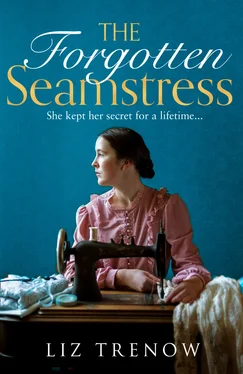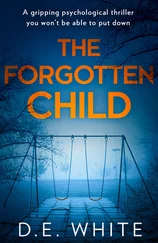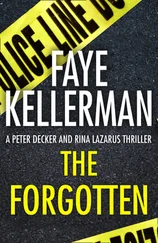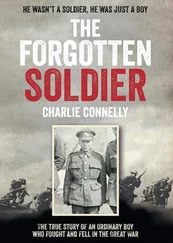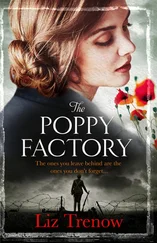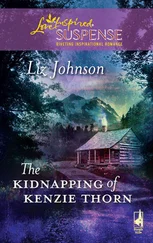‘And I would very much like to hear it, that’s what I’m here for.’
That’s very kind of you, my dear. You see, when you’ve been hidden away from real life for so many years, what else is there to do but remember the times when you were young, when you were meeting new people every day, when you were allowed to have feelings, when you were alive? Nothing. Except for me needlework and other creations, they were the only things that would give me a bit of comfort. So I tell my story to anyone who will listen and I don’t care if they call me a fantasist. Remembering him, and the child I lost, is the only way I could hold onto reality.
So, where do you want me to start?
‘At the beginning would be fine. The tape is running now.’
You’ll have to bear with me, dearie, it’ll take some remembering, it was that long ago. I turned seventy-four this year so the old brain cells are not what they used to be. Still, I’ll give it a try. You don’t mind if I carry on with me sewing while I talk, do you? It helps me concentrate and relax. I’m never happy without a needle in my fingers. It’s just a bit of appliqué with a button-hole stitch – quite straightforward. Stops the fabric fraying, you see?
She is caught by a spasm of coughing, a deep, rattling smoker’s cough.
Hrrrm. That’s better. Okay, here we go then.
My name is Maria Romano and I believe my mother was originally from Rome, though what she was doing leaving that beautiful sunny place for the dreary old East End of London is a mystery. Do they all grow small, the people who live in Italy? Mum was tiny, so they said, and I’ve never been more than five foot at the best of times. These days I’ve probably shrunk to less. If you’re that size you don’t have a cat’s chance of winning a fight so you learn to be quick on your feet – that’s me. I used to love dancing whenever I had the chance, which wasn’t often, and I could run like the wind. But there have been some things in my life even I couldn’t run away from – this place being one of them.
The strange thing is that, after all those years of longing to get out, once we was allowed to do what we liked, we always wanted to come back – it felt safe and my friends were here. It was my home. When they started talking about sending us all away to live in houses it made me frightened just to imagine it, and if it was worrying me, what must it have been like for the real crazies? How do they ever cope outside? You’re a socio-wotsit, aren’t you? What do you think?
‘I’m happy to talk about that later, if you like, but we’re here to talk about you. So, please carry on.’
I will if you insist, though I can’t for the life of me imagine what you find so interesting in a little old lady. What was I talking about?
‘Your mother?’
Ah yes, me poor mum. Another reason to believe she was Italian is my colouring. I’m all grey now, faded to nothing, but my skin used to go so dark in summer they said I must have a touch of the tar brush, and my shiny black curls were the envy of all the girls at the orphanage. Nora told me the boys thought I was quite a looker, and I learned to flash my big brown eyes at them to make them blush and to watch their glances slip sideways.
‘The orphanage?’
Ah yes, Mum died when I was just a babe, only about two years old I was, poor little mite. Not sure what she died of, but there was all kinds of diseases back then in them poor parts of the city, and no doctors to speak of, not for our kind at least. They hadn’t come up with antibiotics or vaccinations, nothing like that – hard to believe now, but I’m talking about the really old days, turn of the century times.
After he’d had his fun, my father disappeared off the scene as far as I knew, and I never heard tell of any grandparent, so when she died I ended up at The Castle – well, that’s what we called it because the place was so huge and gloomy and it had pointy windows and those whatchamacall-ums, them zigzaggy patterns around the top of the walls where the roof should be.
‘Castellations?’
It was certainly a fortress, with high iron gates and brick walls all around. To keep dangerous people out, they told us – this was the East End of London after all – but we knew it was really to stop us lot running away. There was no gardens as such, no trees or flowers, just a paved yard we could play in when the weather was good.
Inside was all dark wood and stone floors, and great wide stairways reaching up three or four storeys; to my little legs it felt like we was climbing up to heaven each time we went to bed. It sounds a bit tragic when I tell it, but I don’t remember ever feeling unhappy there. I knew no different, it was warm and the food was good, and I had plenty of company – some of them became true friends.
The nuns was terrifying to us littl’uns at first, in their long black tunics with sleeves that flared out like bats’ wings when they ran along the corridors chasing and chastising us. Most of ’em was kindly even though some could get crotchety at times. No surprise really, with no men in their lives, and just a load of naughty children.
It was a better start in life than I’d have had with my poor mum, I’ll warrant. Pity it didn’t turn out like that in the end.
Anyway, the nuns’ sole aim in life was to teach us little monsters good manners and basic reading and writing, as well as skills like cooking, housework and needlework so we could go into service when we came of an age, which is exactly what happened to me. I ’specially loved needlework. I was good at it, and I loved the attention it give me.
‘It’s a gift from God,’ the nuns would say, but I didn’t believe that. It was just ’cos I had tiny fingers, and I took more trouble than the others, and learned to do it properly. We had all the time in the world, after all.
D’you do any sewing, Miss?
‘Not really, I’m more of a words person.’
You should give it a try. There’s nothing more satisfying than starting with a plain old piece of wool blanket that no one else wants and ending up with a beautiful coat that’ll keep a child warm through many a winter. Or to quilt up scraps of cotton patchwork to make a comfy bedcover that ain’t scratchy and makes the room look pretty besides.
The needlework room at The Castle had long cutting tables and tall windows set so high you couldn’t see out of them, and that was where we spent most of our days. In winter we’d huddle by the old stove in the corner, in summer we’d spread out round the room in gaggles so that we could gossip away from those nuns’ ears, which was sharp as pins.
It was all hand-stitching, mind, no sewing machines in those days of course. And by the time I was ten I knew which needle to use with which fabrics and which kind of thread, and I could do a dozen types of stitch, from simple running stitch and back stitch, to fancy embroidery like wheatear and French knots, and I loved to do them as perfect and even as possible so you could hardly tell a human hand had made them. Sister Mary was a good teacher and loved her subject, and I suppose she passed her enthusiasm on to us, so before long I could name any fabric with my eyes closed, just by the feel, tell the difference between crêpe and cambric, galatea and gingham, kersey and linsey-woolsey, velvet and velvetine, and which was best for which job.
Not that we saw a lot of fine fabrics, mind, it was mostly plain wool and cotton, much of it second hand what we had to reclaim from used garments and furnishings. But on occasions the local haberdashery would bring rolls of new printed cottons and pattern-weave wools they didn’t want no more, out of charity I suppose for us poor little orphan children, and the other little orphans we was making the clothes for.
Читать дальше
